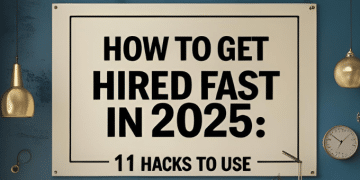How To Tailor Your Resume For Different Industries

Let’s be honest—sending out the same resume to every job just doesn’t cut it anymore. Employers today can spot a generic application from a mile away. If you really want to stand out, especially in the fast-paced U.S. job market, you need to show that you get the industry you’re applying to. That means customizing your resume to speak the language, highlight the right skills, and connect with what hiring managers in that field are actually looking for.
Think about it: a creative director at an ad agency won’t be looking for the same things as a hiring manager in finance. One wants storytelling and personality, the other wants numbers and precision. Tailoring your resume is about showing you understand those differences—and that you’re already thinking like someone in that role.
What you’ll get from this guide:
- Why tailoring your resume matters in 2025
- Which sections to customize for each field
- Examples across tech, healthcare, finance, and more
- Actionable resume tips USA professionals are using
- How to build strong industry-specific resumes that get results
Why Tailoring Your Resume Makes a Real Difference

Hiring managers don’t have hours to read resumes. According to a study by TheLadders, they only spend about 7 seconds on the first scan. That means your resume needs to speak their language fast.
When you tailor your resume, you’re doing more than just swapping out job titles. You’re showing that you’ve taken the time to understand the job, the company, and the industry. It tells the employer, “Hey, I know what matters to you—and I’ve got it.”
Plus, most companies use applicant tracking systems (ATS) that scan for keywords. Customizing your resume boosts your chances of even making it into the hiring manager’s hands.
Understanding What Different Industries Care About
Each industry has its own vibe. The way you talk about your skills—and even which ones you highlight—should shift depending on the role and field. Here’s a breakdown of what different industries usually prioritize:
Read next: How To Make A Resume That Gets You Noticed And Hired: A Step-By-Step Guide
Tech Jobs
- What to Focus On: Tools, coding languages, certifications, agile experience
- Style: Direct, data-driven, results-oriented
- Extras: GitHub, project links, relevant software
Healthcare
- What to Focus On: Certifications, patient care, compliance
- Style: Compassionate, precise, professional
- Extras: CPR training, HIPAA knowledge, EMR/EHR experience
Finance
- What to Focus On: Metrics, KPIs, cost savings, process improvements
- Style: Conservative, clear, focused on risk and outcomes
- Extras: CPA, QuickBooks, advanced Excel skills
Creative Industries (Design, Marketing, Media)
- What to Focus On: Campaign results, branding wins, visuals
- Style: Friendly, expressive, slightly informal (but still polished)
- Extras: Portfolio, case studies, client testimonials
Skilled Trades & Manufacturing
- What to Focus On: Safety, efficiency, reliability
- Style: Straightforward, no fluff, detail-driven
- Extras: Licenses, safety training (like OSHA), machinery experience
What to Customize on Your Resume
Not everything needs to change every time, but these sections are where customization packs the most punch:
Professional Summary
This is your elevator pitch. Customize it to match the tone and focus of the job.
Tech example: “Frontend developer with 4+ years building responsive web apps using React and JavaScript. Skilled in agile teams and rapid deployment.”
Healthcare example: “Certified medical assistant with hands-on experience in patient intake and EMR systems, dedicated to providing compassionate, efficient care.”
Skills Section
This is prime keyword territory, especially for ATS.
- Tech: React, Node.js, SQL, Agile workflows
- Finance: Budgeting, Financial Modeling, Risk Analysis
- Healthcare: Patient Scheduling, EHR, HIPAA Compliance
Pick the skills that match the job description. Don’t stuff your resume with buzzwords—just make sure the right words are in there.
Work Experience
Frame your accomplishments in a way that resonates with the field. For example:
Finance:
- Cut quarterly spending by 18% through new audit protocols
Marketing:
- Led rebrand that drove a 40% boost in customer engagement
Resume tips USA job seekers swear by? Use numbers. They make your impact clear and measurable.
Read next: 10 LinkedIn Profile Secrets Of The Top 10% (And How To Steal Them!)
Certifications & Training
Some industries require them—don’t bury them. Put them front and center if they’re relevant.
Examples:
- CompTIA A+ for tech support
- OSHA-30 for construction
- CPA or Series 7 for finance
- CNA license for healthcare
This is also where industry-specific resumes really shine. Not every job needs a certification—but if yours does, make it obvious.
Tailoring in Action: Real-World Examples
Scenario 1: Marketing Applicant
Generic: “Experienced in social media and branding.”
Tailored: “Digital marketing specialist with 5+ years running cross-platform campaigns for B2C brands, increasing Instagram engagement by 3x in under six months.”
Scenario 2: Career Switch to Tech
Generic: “Retail associate with customer service skills.”
Tailored: “Customer-focused problem solver transitioning into web development after completing a full-stack bootcamp. Experienced in HTML, CSS, and JavaScript.”
Scenario 3: Healthcare Newbie
Generic: “Looking for a job in medical field.”
Tailored: “Certified phlebotomy technician trained in patient care, specimen handling, and HIPAA compliance, with recent externship experience in a fast-paced clinic.”
The takeaway? The more your resume sounds like you understand the job, the better your odds.
Top Resume Tips USA Job Seekers Should Know
Here are a few extra tips that work across the board:
- Keep it short: One page is great for early-career folks. Two max for others.
- Use bullets: They make your experience easy to scan.
- Show results: Numbers > buzzwords.
- Match the tone: A resume for a law firm will read differently than one for a startup.
- Tailor every time: Yes, it’s work—but it gets results.
If you remember one thing from this list of resume tips USA job seekers follow: customization beats quantity every time.
Read next: How To Build A Powerful Professional Network That Accelerates Your Career
Making Multiple Industry-Specific Resumes (Without Burning Out)
Don’t worry—you don’t need to write a brand-new resume from scratch every time. Here’s how to create industry-specific resumes efficiently:
- Start with a “Master Resume” – List every job, skill, and accomplishment.
- Create Templates for Each Industry – One for tech, one for finance, etc.
- Use Job Descriptions as a Guide – Highlight repeating terms.
- Tweak the Summary and Skills Sections – These matter most.
- Save and Reuse – Over time, you’ll build a whole library of targeted resumes.
Pro tip: Use a spreadsheet or notes app to track which version you sent where.
Make It About Them, Not You
The key to a great resume isn’t just about showing what you’ve done—it’s about showing why you matter to them. When you take the time to customize your resume for the role and industry, you’re showing employers you’ve already started thinking like someone on their team.
That’s what lands interviews.
Before You Go:
- Use the resume tips USA job seekers rely on to stay competitive
- Build multiple industry-specific resumes that speak to different sectors
- Focus on the needs of each employer—not just your own background
You’ve got the skills. Now build the resume that proves it.





